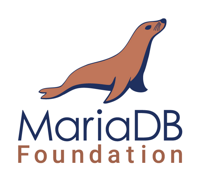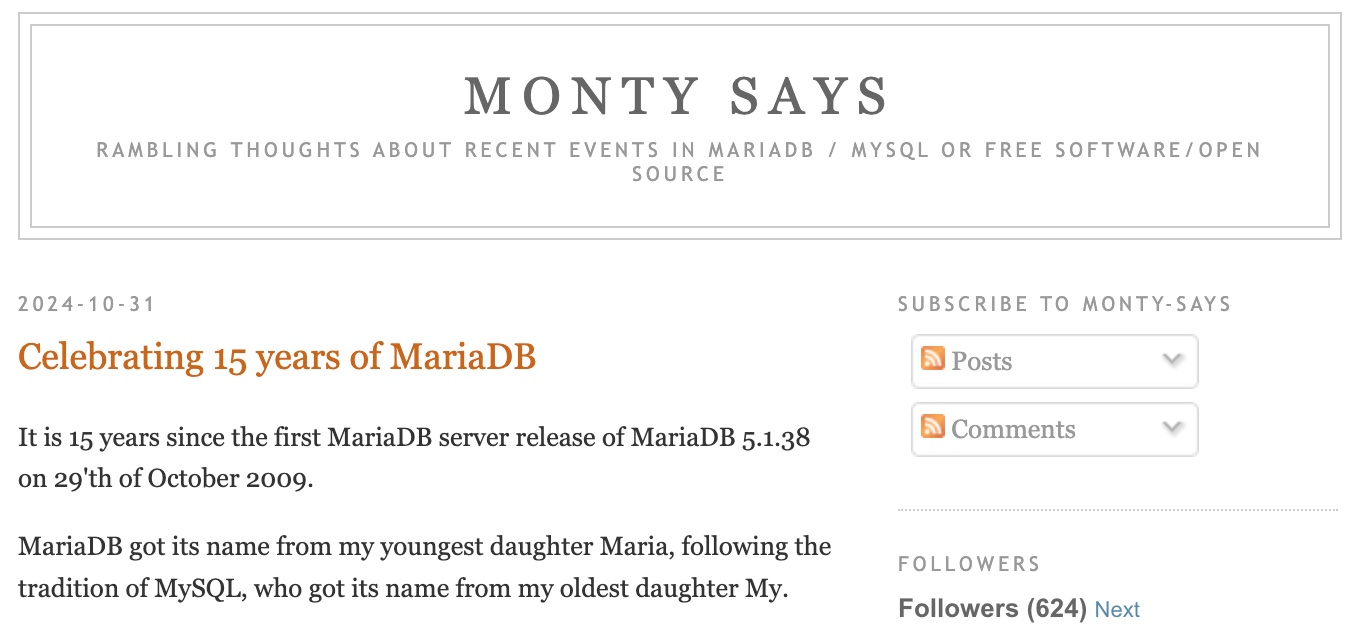On November 6 2024 I presented a talk with the title: “The implementation of MariaDB parallel replication” at a local TeqHub meetup in Copenhagen.
In the talk I first presented how MariaDB replication works overall. I then described the central idea of optimistic parallel replication. Finally I described three details of the implementation: transaction scheduling; conflict detection; and efficient commit ordering. Here are the slides for the presentation.
I was very impressed by the level of the engagement of the audience. There were many questions that showed not only a deep interest in the subject, but also a deep understanding of the material I presented.
…
Continue reading “Talk: The implementation of MariaDB parallel replication”
The MariaDB Foundation is pleased to announce the availability of MariaDB 11.7.1, the latest rolling release Release Candidate (RC), and MariaDB 11.6.2, the latest Generally Available (GA) rolling release.
A subset of the new features in MariaDB 11.7 include:
- Vectors
- Optimizer improvements (including the Charset Narrowing Optimization being on by default)
- Functions for generating version 4 and version 7 UUIDs
- The ROW data type as a return value in stored procedures
See the release notes and changelogs for details. …
Continue reading “MariaDB 11.6.2 and MariaDB 11.7.1 now available”
In 2023, Intel launched Intel® Trust Domain Extensions (Intel® TDX), their latest Confidential Computing technology that ensures data in use protection for hardware-isolated virtual machines and verified hardware and software integrity through attestation.
In this blog post, we will show that MariaDB Server can run correctly on an Intel® TDX enabled VM and that the in-memory data is protected from outside actors, even from the host OS running the VM. By coupling Intel’s Confidential Computing technology with MariaDB Server build in data-at-rest and data-in-transit protection, customers can gain an end-to-end protected solution.
…
Continue reading “Protect your data with MariaDB Server and Intel® TDX”
The MariaDB Foundation is pleased to announce the availability of MariaDB 11.4.4, MariaDB 10.11.10, MariaDB 10.6.20 and MariaDB 10.5.27, the latest stable releases in their respective long-term series (maintained for five years from their first stable release dates), as well as MariaDB 11.2.6 the latest and final scheduled release in the 11.2 short-term series (maintained for one year)
See the release notes and changelogs for details.
Release Notes Changelog What is MariaDB 11.4?
…
Continue reading “MariaDB 11.4.4, 11.2.6, 10.11.10, 10.6.20 and 10.5.27 now available”
We have been in festive mode this week, celebrating fifteen years of MariaDB. You may have seen our very own Ian Gilfillan’s blog MariaDB Server turns fifteen!, or the blog of Alejandro Duarte of MariaDB plc, MariaDB Server Turns 15! Here Are 15 Reasons Why Developers and DBAs Love It.
Technical overview by the creator of MariaDB Server
Now, MariaDB Server’s creator Michael »Monty« Widenius has chimed in, with a lot of technical detail. Hardly anybody is better equipped to create this technical overview, Celebrating 15 years of MariaDB.
…
Fifteen years ago, Internet Explorer made up about two-thirds of all browsers, Firefox the majority of the rest, while a newly-released browser called Chrome was starting to appear in the rankings.
Fifteen years ago, iPhone OS overtook Windows Mobile in worldwide smartphone market share, but still trailed the giants of Blackberry’s RIM and Symbian, used by market leader Nokia, while Google’s new Android ecosystem was just starting to show signs of momentum.
And in the database world, as Oracle moved to acquire MySQL, a new upstart called MariaDB was born as a fork of MySQL, birthed by MySQL founder Monty Widenius with the support of many of the original MySQL developers.
…
Today, we are excited to announce a new fund to help give MariaDB Vector a high-quality integration into as many LLM frameworks as possible. This means that you can get rewarded for integrating MariaDB Vector into a known framework! This program will run until the end of February 2025.
How it will work
- Pick a framework: You need to pick one of the frameworks from the list curated by Qdrant that you would like to work on adding MariaDB Vector support to.
- Contact us: Contact us on the MariaDB Zulip, in the General channel, just create a topic.
…
Continue reading “Announcing the MariaDB Vector Bounty Program!”
Did you read the TechCrunch article on MariaDB? “How do you solve a problem like MariaDB? Cozy up to the community, says new CEO“. If not, I suggest you do!
We’re in India 23-25 Oct 2024!
And if you want to know more, and happen to be in India at the end of the month, come and listen to me interviewing MariaDB creator Michael “Monty” Widenius, MariaDB plc’s new CEO Rohit de Souza, and MariaDB plc’s new Chief Product Officer Vikas Mathur. We’ll be at Open Source India on 23-24 Oct 2024 in Bengaluru, Karnataka, India, and we’re adding a MariaDB ServerFest India on Friday 25 Oct 2024.
…
Continue reading “MariaDB – the Foundation, the Company, and the Future of the Sea Lion”




